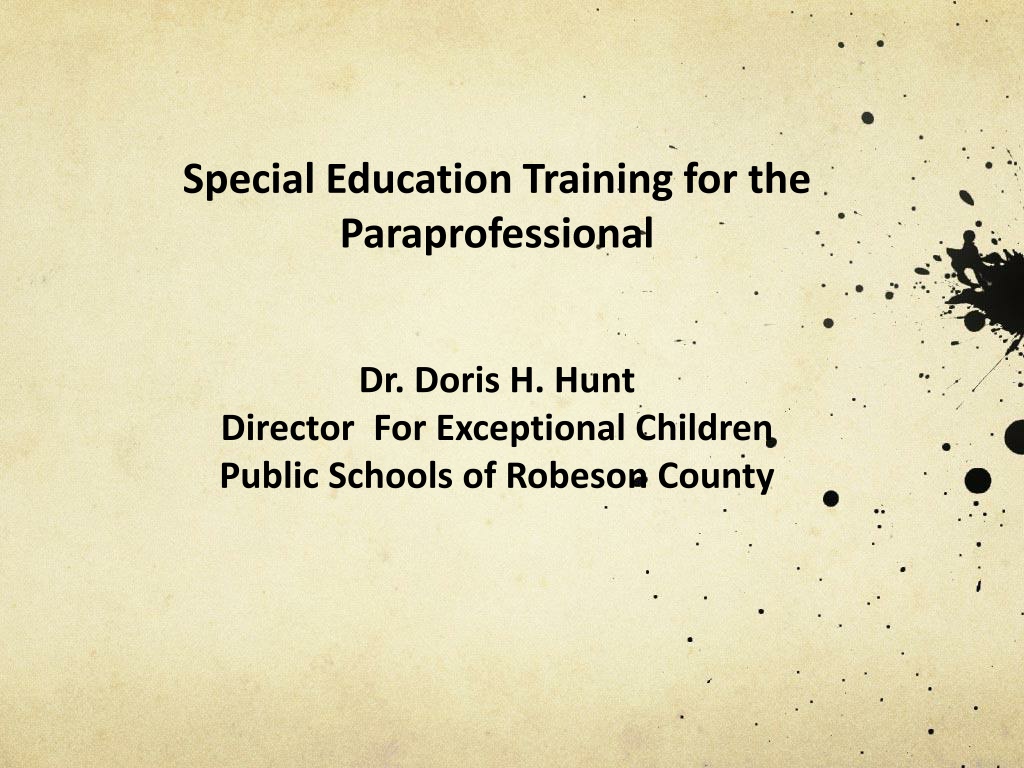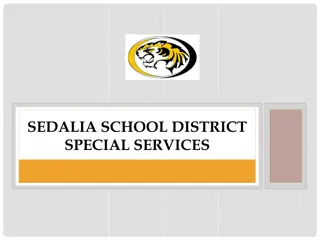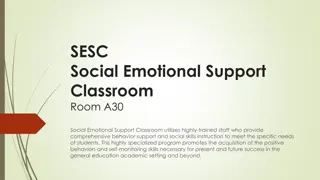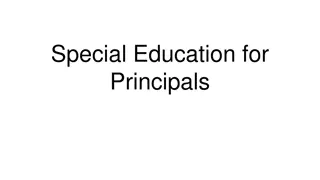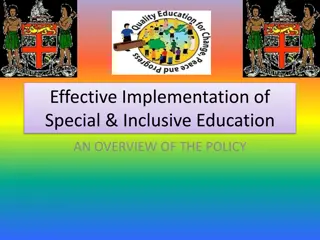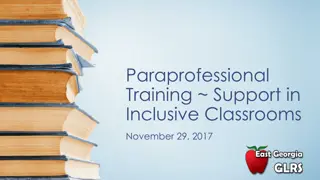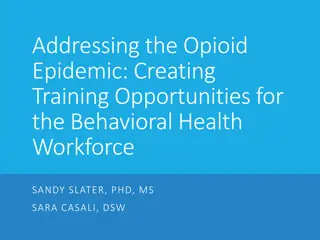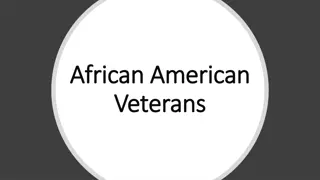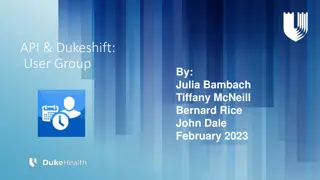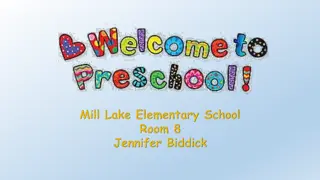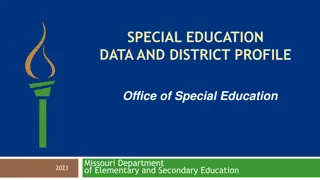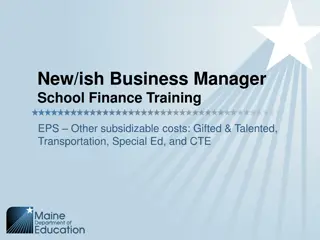Special Education Training for Paraprofessionals by Dr. Doris H. Hunt
This article discusses the roles and responsibilities of paraprofessionals in the education sector, particularly in special education settings. It covers qualification requirements, training guidelines, and compares North Carolina's practices with other states regarding professional development for paraprofessionals.
Download Presentation

Please find below an Image/Link to download the presentation.
The content on the website is provided AS IS for your information and personal use only. It may not be sold, licensed, or shared on other websites without obtaining consent from the author. Download presentation by click this link. If you encounter any issues during the download, it is possible that the publisher has removed the file from their server.
E N D
Presentation Transcript
Special Education Training for the Paraprofessional Dr. Doris H. Hunt Director For Exceptional Children Public Schools of Robeson County
Paraprofessionals Are School Employees Work under the supervision of teachers or other professionals Have responsibility for A) Identifying learner needs B) Developing and implementing programs to meet these needs C) Assessing learner performance D) Evaluating the effectiveness of education programs and related services E) Assisting with the delivery of direct services as assigned and developed by their supervisors 1. 2. (Pickett, 2002)
a rose by any other name Paraeducator Paraprofessional Teacher Assistant Teacher Aide Para There are over 21 titles for paraprofessionals What would you want your title to be?
Qualification Requirements For Instructional Paraprofessionals In North Carolina Instructional Paraprofessionals in Title 1 follow the NCLB guidelines. Special Education paraprofessionals are required to have: A high school diploma or equivalent; AND An Associate s (or higher) degree; OR Completion of 48 credit hours at an Institution of Higher Education; OR Paraprofessionals must also work under the direct supervision of a teacher. (DESE, 2003)
Paraprofessionals: Special Education In North Carolina NCLB guidelines are followed No specialized training is required Training is generally on the job Increasing numbers are 1:1 aides There are issues in many districts regarding supervision and training of special education paraprofessionals There is no credentialing of instructional paraprofessionals Teachers do not receive specific training regarding paraprofessionals
How Does NC Compare To Other States? http://t0.gstatic.com/images?q=tbn:ANd9GcRuQmc4Jsq541WYovI6nh4HAXvgwAOplg_K2yReeOgbC2D17Mwy Only 12 states have professional development programs for paraprofessionals: Delaware Georgia Hawaii Idaho Michigan Mississippi New Hampshire New Mexico New York Ohio Rhode Island (Pennsylvania)
10 States Require Certification Delaware Georgia Maine Minnesota New Mexico New York North Dakota Ohio Texas West Virginia http://t0.gstatic.com/images?q=tbn:ANd9GcShoiNvZx6yGen8DErUbnbz3agTy8JEj1RF8I9ciQOHnSen0ppr
12 States Exceed Federal Requirements Illinois New Hampshire Maine New Mexico Minnesota New York Mississippi Rhode Island Nebraska Washington Georgia West Virginia
Significance According to the Bureau of Labor Statistics (BLS) Occupational Outlook Handbook 2010-2011 Edition: Number of students identified for and enrolled in special education services is increasing. Dependency on paraprofessionals is expanding. As a result, the employment of paraprofessionals is expected to grow by 10% between 2008 and 2018.
Has This changed? Data driven expectations : AYP, NCLB, IDEA 2004 Supervision issues Special education case loads have increased Increased focus on statewide and nationally mandated tests Access to the general education curriculum Q : Are paraprofessionals being overused?
Literature Review What does prior research reveal about . 1. The changing roles of paraprofessionals? 2. Current practices for training? 3. The essential skills and competencies needed for paraprofessionals ? 4. The training needs for teachers to be able to effectively supervise paraprofessionals? 5. The roles and responsibilities of paraprofessionals?
Evolving Roles Roles and responsibilities have changed dramatically since they were first introduced into the classroom more than six decades ago. Many new responsibilities and mandatory assessment requirements have been added to U.S. classrooms over the last 40 years. The use of paraprofessionals to support students, teachers and classrooms in meeting these increasing demands has grown proportionately.
Myth or Truth? Paraprofessionals always understand and support the inclusive philosophy that places them in the general classroom. http://t0.gstatic.com/images?q=tbn:ANd9GcSsCtmqsX9a_I5SyzTwDtwqU3BEXdVV5xaJORXlSS5dYJQ82xMl9A Myth Many paraprofessionals prefer the special education classroom and find the general classroom confusing and upsetting.
Training Needs Required training elements have not been defined: IDEA Amendment of 1997, requires that paraprofessionals be appropriately trained and supervised. The Amendment does not specify the type or amount of training required. Similarly, NCLB legislation outlines paraprofessionals' qualifications and duties that they may perform. NCLB does not specify what an appropriate training program should entail.
Myth or Truth? The Paraprofessional doesn t always know what to do with a student. http://t0.gstatic.com/images?q=tbn:ANd9GcS8bndsmkqRfAccU8kCDx6EIzhQz0Gm5F67yxTwQPa3Bb6U2DbT Truth The assumption is often made that if a paraprofessional is placed in a classroom with a student then they know what to do.
Standards And Competencies The American Federation of Teachers (AFT) and the National Joint Committee on Learning Disabilities, Inc. have advocated for the development of comprehensive standards and competencies for paraprofessionals. Paraprofessional standards address: Multiple aspects of education and instruction Provide guidelines for the skills paraprofessionals should master in each domain
Competencies Include: Foundations of special education Characteristics of learners Assessment and evaluation Instruction, content and practice Planning and management Student behavior and social interaction Communication and collaboration Professionalism and ethical practices
Myth or Truth? The paraprofessional is fully trained for his or her classroom assignment. http://t0.gstatic.com/images?q=tbn:ANd9GcSsCtmqsX9a_I5SyzTwDtwqU3BEXdVV5xaJORXlSS5dYJQ82xMl9A Myth Training often occurs on the job and is the responsibility of all the professionals associated with the student and program.
Training Of Teachers Who Supervise Paraprofessionals Teachers often feel as though they are not prepared to supervise paraprofessionals in school settings. Teacher preparation programs, however, have not changed to accommodate the increasing need to prepare teachers for the supervisory role they must assume with the growing number of paraprofessionals.
Myth or Truth? The paraprofessional receives all instructions and directions from the special education teacher. Myth The paraprofessional will receive some instruction from the special education teacher, from the general education teacher and from related service providers. http://t0.gstatic.com/images?q=tbn:ANd9GcS8bndsmkqRfAccU8kCDx6EIzhQz0Gm5F67yxTwQPa3Bb6U2DbT
Pickett, Vasa And Steckelberg Stated: In far too many cases, teachers are not prepared to direct paraeducators, to evaluate their performance, to provide feedback and training, or to assess the potential for greater use of paraeducators in order to free teachers to provide increased instructional services (p.31). (1993)
Myth or Truth? Teachers are always trained and prepared to work with paraprofessionals. http://t0.gstatic.com/images?q=tbn:ANd9GcSsCtmqsX9a_I5SyzTwDtwqU3BEXdVV5xaJORXlSS5dYJQ82xMl9A Myth Teachers are not prepared to direct, evaluate or provide feedback and training to paraprofessionals
Roles And Responsibilities Of Paraprofessionals Paraprofessionals support the instruction, supervision and classroom management as a member of the school team. Paraprofessionals have a high level of responsibility but a low level of training and support to help them do their jobs effectively. Paraprofessionals are often utilized in schools to aid with direct student instruction, and serve as learner supports .
Roles And Responsibilities Continued Special education paraprofessionals are hired to work directly with the most challenging students in the school: They are often unprepared for the task. Demands of parents, advocates, administrators and teachers have caused an increase in 1:1 paraprofessional assignments. Q: Are paraprofessionals being used effectively in your school settings? Q: Is there an overuse of paraprofessionals?
Myth or Truth? The paraprofessional can work with all students in the classroom. http://t0.gstatic.com/images?q=tbn:ANd9GcS8bndsmkqRfAccU8kCDx6EIzhQz0Gm5F67yxTwQPa3Bb6U2DbT Truth The paraprofessional can work with all students as long as the needs of the identified students are being met.
Myth or Truth? There are restrictions on what paraprofessionals can do. Truth There are actually legal and ethical limits on the responsibilities that paraprofessionals are allowed to have. http://t0.gstatic.com/images?q=tbn:ANd9GcS8bndsmkqRfAccU8kCDx6EIzhQz0Gm5F67yxTwQPa3Bb6U2DbT
Myth or Truth? The paraprofessional will see that all the needs of the students with special needs are met. http://t0.gstatic.com/images?q=tbn:ANd9GcS8bndsmkqRfAccU8kCDx6EIzhQz0Gm5F67yxTwQPa3Bb6U2DbT Myth The para is a support person - needs should be met by collaborative planning by all adults.
Increasing Demands Require An In-depth Analysis Of: Current practices Existing competencies Areas for improvement Investigation into the types of training that will support, develop, and facilitate paraprofessionals contributions to special education services. (Aldridge & Goldman, 2002; Carpenter & Dyal, 2007; D Aquanni, 1997; Milner, 1998; Pickett, 2002; Young 2006)
A Quote From A Paraprofessional Please remember, that I am only one person, and I make mistakes too. I do try my hardest for you and the students but if you do not tell me how to improve or what I am doing wrong, then I am going to continue to do what I know because I think that is what you expect of me.
Teachers Want Paraprofessionals To Be Provided With: Initial Orientation Specific training that relates to the students needs in the classroom. Increased planning time with the paraprofessionals. Additional on-the-job training Training in Positive Behavioral Interventions and Supports (PBIS)
Teachers Want Training In: Strategies to help support paraprofessionals How to supervise and manage paraprofessionals more effectively and efficiently. Conflict Resolution A better understanding of the paraprofessionals roles and responsibilities. A better understanding in how to plan, train and support paraprofessionals in their roles.
A Quote From A Teacher Working with paraprofessionals is something that I was never trained in and was one of the most difficult tasks I encountered when I first became a teacher. There were no college courses that provided any guidance or support regarding paraprofessionals. Once on the job, there was no support or training provided either. Please let me know where, when and how I can find a course or conference that addresses these areas of concern.
In the field of education, it is important for all of us to stay current in best practices and develop and increase our skills. Therefore, training needs to be provided in an on-going, continuous process through out the paraprofessional s career. This training needs to start the day that they accept the position and continue until they are no longer in the field of education.
Schools cannot adequately function without paraprofessionals, and paraprofessionals cannot adequately function in schools that lack an infrastructure that supports and respects them as viable and contributing members of instructional teams. They need to be treated and respected as the professionals that they are: PARAEDUCATORS
Students with Special Health Care Needs Those students who require individualized health care plans to enable participation in the educational process. Mandated by Federal and State Law: Section 504 of the Rehabilitation Act of 1973; Public Law 108- 466, the Individuals with Disabilities Education Act (IDEA), 2004; and Americans with Disabilities Act (ADA).
Section 504 of the Rehabilitation Act of 1973 Prohibits discrimination because of disability and requires any program/public school to make reasonable accommodations for individuals with disabilities. Protects any student with a physical or mental impairment which substantially limits one or more major life activities such as caring for one s self, performing tasks, walking, seeing, hearing , speaking, breathing, learning and working.
Section 504 of the Rehabilitation Act of 1973 Prohibits discrimination because of disability and requires any program/public school to make reasonable accommodations for individuals with disabilities. Protects any student with a physical or mental impairment which substantially limits one or more major life activities such as caring for one s self, performing tasks, walking, seeing, hearing , speaking, breathing, learning and working.
Examples A student who requires insulin injection to control diabetes OR medications to avert severe allergic reactions. A student who uses a wheelchair in their daily routine. A student who receives supplemental nutrition through a feeding tube.
Section 504 Statute prohibits discrimination against individuals with disabilities, including students, by public school districts receiving federal financial assistance. U.S. Office for Civil Rights (OCR) enforces the provisions of Section 504.
Section 504 Does not have state or federal funding provided to assist districts in complying with implementation. All costs are the obligation of the local school district. Section 504 is a law of access, not of benefit. Section 504 is an existing federal law, and complying with it is NOT an option.
Section 504 Requires that a school district makes reasonable accommodations for a student with disabilities to permit that student an equal opportunity to participate in educational and related activities. Free and appropriate public education (FAPE). Often these required accommodations may include providing the student with school health services/ health care plan.
IDEA 2004 Provides for the inclusion of students with chronic illnesses; with complex health care needs; and/or who are technology dependent through a process of determined eligibility as having a disability.
Special Education Law Any questions about Special Education Law or Section 504 can be answered by the Special Education Teacher, Section 504 Coordinator or Special Education Supervisor.
FERPA & HIPAA Family Educational Rights and Privacy Act (FERPA) protects the student s educational record. Health Insurance Portability and Accountability Act (HIPAA) governs the private health information.
Protecting Confidentiality NEVER discuss a student with anyone except those directly involved with the student and their care (i.e. nurse, special education teacher, therapist) Should a discussion need to occur regarding the student and their care MAKE SURE: It occurs in a private area with doors closed and not where others may hear what is discussed. DISCUSSIONS SHOULD NEVER OCCUR IN PUBLIC PLACES, I.E. GROCERY STORE, CHURCH OR ON A CELL PHONE AFTER SCHOOL HOURS.
RN Supervision Only RNs can determine what medically necessary nursing care can be safely delegated to paraprofessionals and under what circumstances. Paraprofessionals may be accountable to the supervising teacher/LEA supervisor/principal for personnel and school building functions; however they must have RN supervision when assigned delegated nursing tasks.
Guidelines for RNs The RN should provide 1) general training; 2) student- specific training; and 3) training for student involvement in self- care. When possible, the student should be encouraged and allowed as much responsibility as can be safely appropriate.
Delegation of Duties The school RN provides training in student- specific procedures for the essential caregivers who will be responsible for providing direct care for the student during the school day.
3 Types of Training 1. General Training; 2. Student- Specific Training; and 3. Training for student involvement in self- care.
Key Components of general training for all school employees Description of the health condition and appropriate actions required for the safety of all students; Example: Interventions for any student having a seizure. DOES NOT mean giving a copy of the IHP to everyone (violation of confidentiality) Emergency ;and Awareness component.
